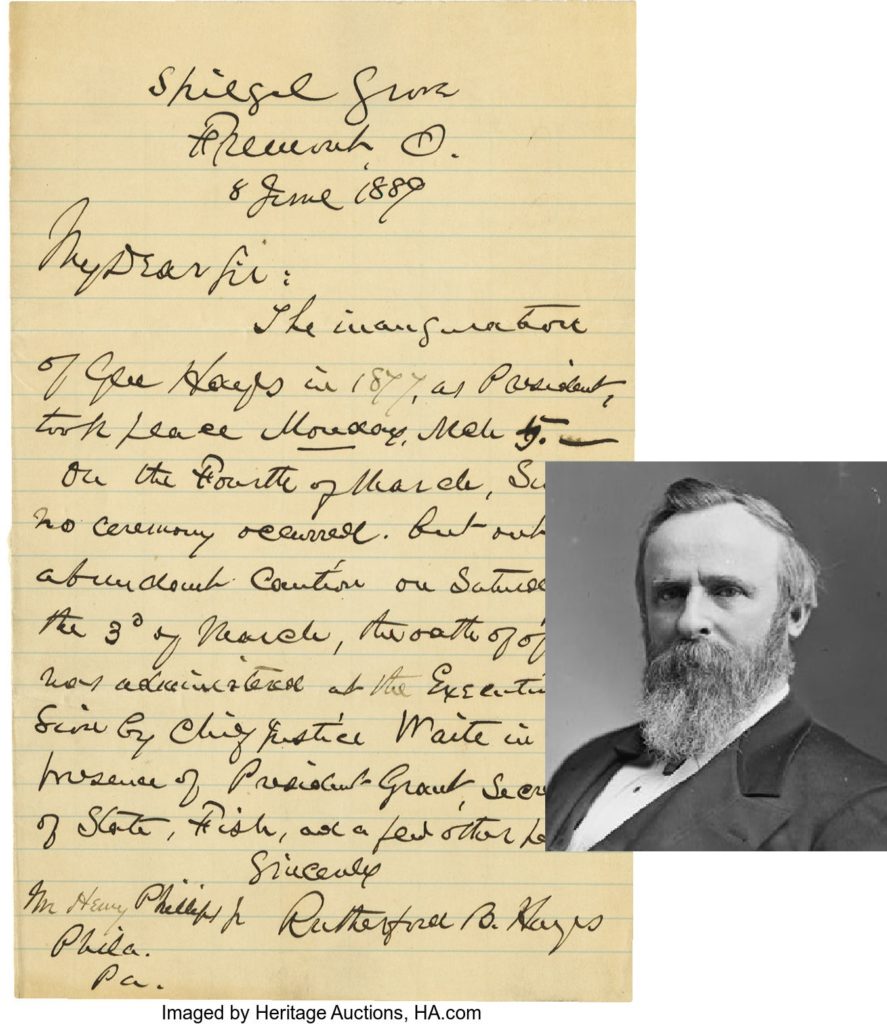
By Jim O’Neal
One discouraging trend in American culture is treating everything from a partisan-political standpoint. I can recall not too long ago after an election, we’d simply forget about our disagreements about candidates and resume normal civility. Now it seems that nearly everything gets politicized, dividing the nation into continually warring tribes of Red and Blue. Some political pundits see the starting point as the 2000 Gore versus Bush election, with its hanging chads and the controversial Supreme Court decision to stop the vote recount in Florida. Others believe the feud between President Bill Clinton and Speaker Newt Gingrich exacerbated it.
However, to accept either theory requires ignoring the 1876 presidential election between Samuel Tilden and Rutherford B. Hayes.
Hayes, the Republican, was a lawyer from Ohio who distinguished himself during the Civil War as a brave soldier who was wounded five times and eventually promoted to a brevet major general. After the war, he served in Congress and was elected governor of Ohio three times.
Tilden also had a legal background and was the 25th governor of New York (1875-76). As the Democratic candidate for the presidency in 1876, he is still the only individual to win an outright majority (not just a plurality) of the popular vote, but lose the election … in a rather bizarre series of events. Four other candidates have lost the presidency despite having a plurality of the popular vote (Al Gore and Hillary Clinton are the most recent to suffer this fate).
It had generally been assumed that incumbent President Ulysses S. Grant would run for a third term, despite a troubled economy and numerous scandals that had been discovered during his two terms, which started in 1869. There was also the two-term precedent established by George Washington. In spite of these formidable barriers, Grant’s inner circle of advisors were eager to maintain political power. While Grant was on the verge of announcing his candidacy, the House of Representatives preempted him by passing a resolution by an overwhelming margin, 233-18, establishing a two-term limit to prevent a dictatorship. Grant reluctantly withdrew his name from consideration.
The Democrats proceeded with their National Convention in June 1876 in St. Louis (the first time a major political convention was held west of the Mississippi). They selected Tilden on the second ballot and added Thomas Hendricks for vice president, since he was the only one nominated. The Democrats were hungry for a win since they had been out of power since James Buchanan, who was elected a full 20 years earlier in 1856.
What followed was the most contentious presidential election in American history. On the first vote in the Electoral College, Tilden had 184 votes (only one short) while Hayes was stuck at 165. However, there were 20 votes being contested in four states (Florida, Louisiana, South Carolina and Oregon) and both parties were claiming victory. This impasse caused a Constitutional crisis and, finally, a beleaguered Congress passed a law on Jan. 29, 1877, to form a special 15-member Electoral Commission to settle the dispute. After a great debate, the commission awarded all 20 disputed votes to Hayes, who became president with 185 votes to Tilden’s 184.
In return, Republicans passed a resolution that required an end to Reconstruction and the removal of all federal troops from every Southern state. Over the next 20 years, the states passed all kinds of laws and regulations that effectively wiped out the provisions of the 14th and 15th Amendments to the Constitution that granted numerous rights to the black population. It would take another 60 years to regain them when LBJ was president and finally crack the “Solid South” grip on national politics.
Maybe we are doomed to be a divided nation, but I suspect that strong leaders will emerge, eventually, and help us remember the advantages of a group of united states … E pluribus unum.
 Intelligent Collector blogger JIM O’NEAL is an avid collector and history buff. He is president and CEO of Frito-Lay International [retired] and earlier served as chair and CEO of PepsiCo Restaurants International [KFC Pizza Hut and Taco Bell].
Intelligent Collector blogger JIM O’NEAL is an avid collector and history buff. He is president and CEO of Frito-Lay International [retired] and earlier served as chair and CEO of PepsiCo Restaurants International [KFC Pizza Hut and Taco Bell].
